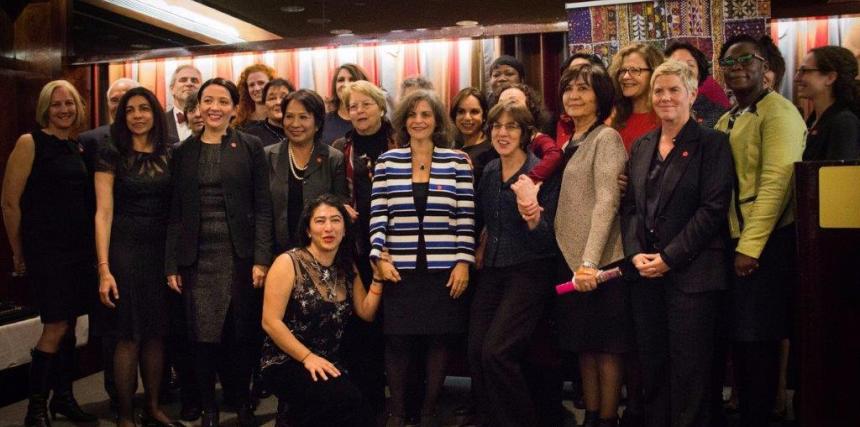Last night, CCR was proud to count our staff and partners among the incredible people and groups inducted into the inaugural Gender Legacy Wall—including the late Rhonda Copelon, former CCR vice president; the late Barbara Blaine, friend, colleague, and client; and Senior Staff Attorneys Katherine Gallagher and Pamela Spees. Spearheaded by the Women’s Initiatives for Gender Justice, the Gender Justice Legacy Wall, which will be installed at the International Criminal Court, honors and celebrates those “whose work, resilience, and vision have inspired incredible developments in the gender justice field” over the past 125 years. Its launch coincides with the 15-year anniversary of the launch of the International Criminal Court, almost 20 years since the adoption of the Rome Statute, which established the court.
The ceremony honored practitioners, advocates, attorneys, grassroots organizations, academics, and others who have made groundbreaking contributions to the field, but it is intended as a “living legacy, with more names to be added at future significant anniversaries of the Rome Statute, as the gender justice field continues to evolve, as others are recognized, and as future generations join and contribute to this endeavor.” Indeed, considered together, the work of the CCR leaders honored last night includes both historic contributions and our continuing work built on that foundation.
One of the principal architects of that foundation was the late Rhonda Copelon, former vice president of CCR, who was a trailblazer in imbuing principles of gender justice into U.S. and international law. Her spirit was invoked last night as a vital part of the early partnership formed among women from all over the world, creating a space where all voices were recognized. Among her groundbreaking contributions was suing former Bosnian Serb leader Radovan Karadžić for genocide, war crimes, and crimes against humanity – including the campaign of rape and other sexual violence as a form of torture and genocide. She also contributed to the International Criminal Tribunals for Rwanda and the Former Yugoslavia. Through these cases, rape and sexual violence were recognized as torture and a form of genocide, and that precedent became an institutional part of international tribunals and commissions. Before that, as she told The New York Times, rape was seen as “kind of collateral damage…part of the unpreventable, fundamental culture of war.” At CUNY Law School, she founded the International Women’s Human Rights Clinic and the Women’s Caucus for Gender Justice, where she continued this work; in fact, both Katie Gallagher and Pam Spees were among her students.
Katie also worked at the United Nations International Criminal Tribunal for the former Yugoslavia, playing a vital role in the institutional recognition of rape and sexual violence as war crimes and torture, and interned with the Women’s Caucus for Gender Justice in the International Criminal Court. Pam served as Program Director of the Women’s Caucus, where she was instrumental in ensuring that accountability for crimes of sexual and gender violence were a foundational component of the treaty that established the International Criminal Court.
Today, the recognition of sexual violence as torture forms the foundation of CCR’s ongoing work for gender justice—and a primary focus of that work over the past several years has been helping the Survivors Network of those Abused by Priests (SNAP) to hold the Vatican accountable for widespread and systemic sexual abuse by clergy. Barbara Blaine, the visionary founder of SNAP and our colleague and client, who died in September, was also honored last night. Her husband, Howard Rubin, was at the ceremony.
SNAP, together with Pam and Katie, banded together to break through centuries of impunity for widespread sexual violence in the Catholic Church—and this work continues. In partnership with SNAP, CCR filed a formal request for an investigation by the International Criminal Court, and filed reports with the UN that resulted in the Vatican being summoned for the first time and sharply criticized by the UN Committee Against Torture and the UN Committee on the Rights of the Child. In the year after the ICC filing, SNAP was contacted by survivors and supporters in more than 70 countries.
As Pam wrote after Barbara’s death, she started SNAP as a “tiny group of survivors of sexual violence by priests, who came together to support and validate each other…That little support group eventually exploded into an internationalized movement of over 25,000 survivors in countries around the world.”
Other women, men, and organizations honored on the wall included ICC Prosecutor Fatou Bensouda, U.S. Supreme Court Justice Ruth Bader Ginsburg, former United Nations High Commissioner for Human Rights Navi Pillay, and MADRE. The leaders honored last night have made historic contributions for justice for thousands of survivors of sexual violence, and their work forms a foundation on which we continue to build. We look forward to continuing the “living legacy” of the Gender Justice Legacy Wall.


